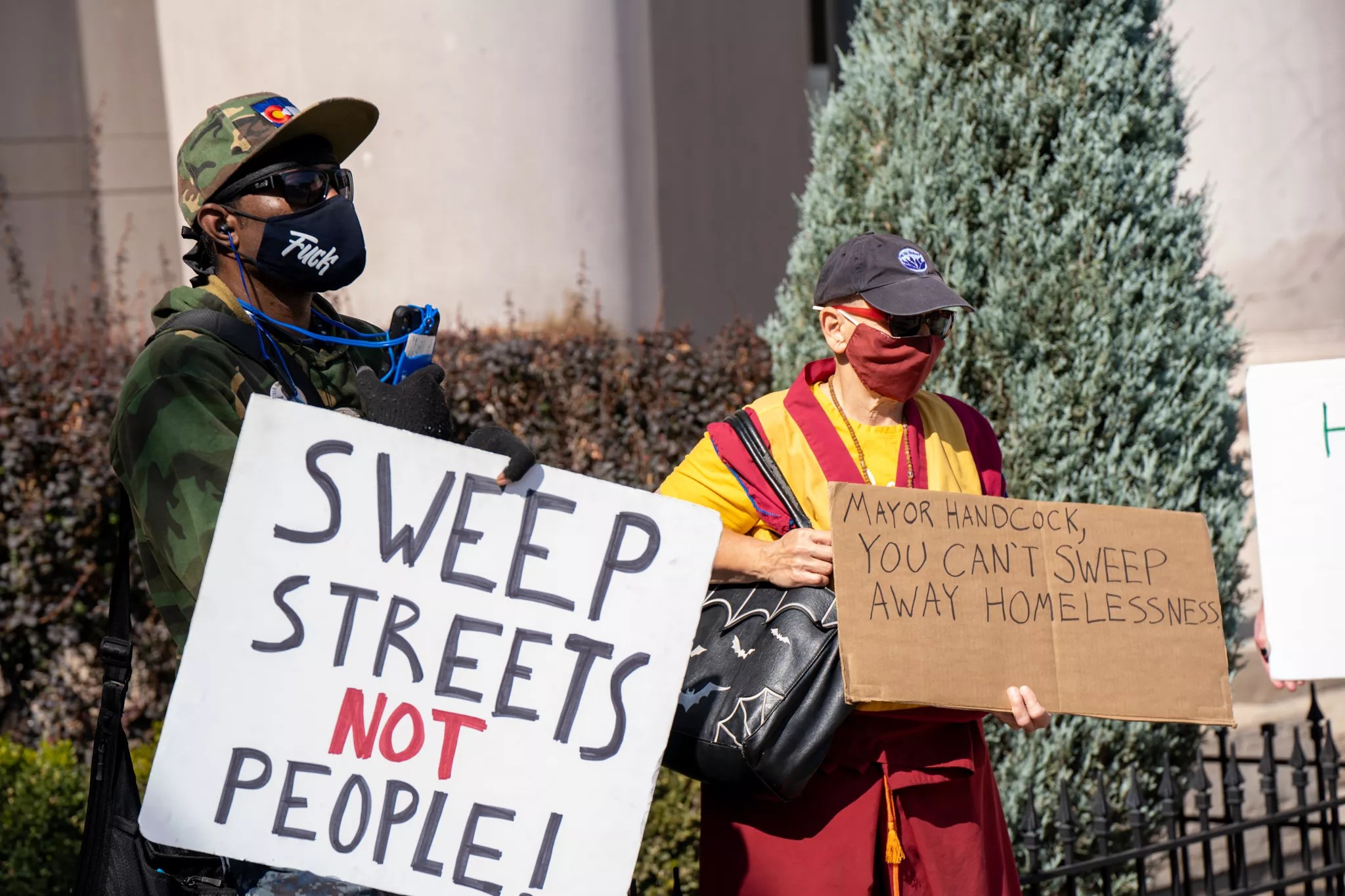
Noah Kaplan

Audio By Carbonatix
A new ruling by a federal judge in California could create a road map for plaintiffs suing the City of Denver over the past summer’s homeless sweeps.
“It’s pretty much the exact ruling we’re looking for from our judge, and the exact same case,” says Andy McNulty, the Killmer, Lane & Newman attorney who filed a lawsuit against Denver and the State of Colorado on behalf of ten homeless individuals and Denver Homeless Out Loud in October. The suit asks the U.S. District Court of Colorado to put a pause on the sweeps of homeless encampments during the COVID-19 pandemic; Judge William Martinez has already heard three days of testimony and could rule on a motion for a preliminary injunction before the end of the month.
On January 20, Judge Susan Van Keulen of the U.S. District Court of Northern California ruled in favor of a motion for a preliminary injunction calling for the City of Santa Cruz to not sweep a large encampment because of the current threat of COVID-19. The injunction will run until the COVID-19 pandemic begins to wind down, at which point the judge will revisit her ruling.
McNulty wasted no time in highlighting Van Keulen’s ruling, filing a notice in court that the California judge’s decision cuts straight to the heart of the Colorado case.
On July 21, Martinez responded, letting McNulty know that the attorney could only point out the existence of the ruling, not share his thoughts on its significance with the court. However, McNulty’s now-stricken filing shows exactly what he hopes Martinez will take from the California ruling.
In his notice, McNulty pointed out that the California judge ruled that the planned sweeps of the Santa Cruz encampment would violate the “Fourteenth Amendment substantive due process rights under the danger creation theory,” and that she had opined that the Centers for Disease Control and Prevention guidelines around sweeping homeless encampments are “clear and direct,” stating that “where there is no alternative housing available, leave the encampments to remain where they are to prevent the potential for infectious disease spread.”
Furthermore, Judge Van Keulen determined that the “City’s interest in cleaning and clearing [the encampments] at this moment in time is outweighed by Plaintiffs’ interest in their constitutional rights during what the Court can only hope is the peak of the COVID-19 pandemic.”
McNulty made similar arguments during an evidentiary hearing that spanned three days in December and January, claiming that the City of Denver had violating the constitution by sweeping homeless encampments during the COVID-19 pandemic, despite the fact that the CDC is advising against such actions.
In the first weeks of the pandemic, the City of Denver had opted to largely put a pause on sweeps and instead allowed encampments to exist without significant intervention. However, as encampments spread around the city, Denver ramped up dispersals of large encampments, particularly in the Capitol Hill neighborhood.
One key difference between the Denver and Santa Cruz cases: The California city’s homeless shelters were totally full at the time of the judge’s ruling. Denver’s shelters still have room.
But McNulty doesn’t see that as much of an obstacle. “I don’t think it makes a difference, because the CDC guidance talks about individual housing, it doesn’t talk about congregate settings,” McNulty says. As he did in court, he notes that congregate settings are especially fertile vectors for COVID-19 transmission.
Despite Judge Van Keulen’s statement that the CDC guidelines are “clear and direct,” in the Colorado case, Martinez had mentioned a “malleability” to the guidelines that could potentially allow encampment sweeps based on an assessment of the “totality of circumstances.”
That observation came at the end of the evidentiary hearing, when Martinez was pushing lawyers representing the various parties to offer their best arguments. “I don’t think that you should glean anything from the judge’s statements,” McNulty says. “Judges always ask the hardest questions; that’s their role. And the role of a judge in oral arguments is to push one side or another and really cut to the heart of the issue and ask you how to respond to the other side’s legal arguments.”
McNulty hopes that Martinez will offer his response by the end of January. Attorneys representing Denver did not respond to requests for comment on the California ruling.